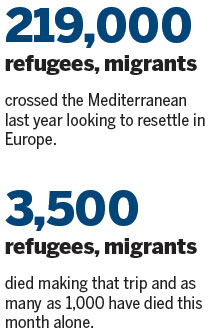EU moves to tackle migrant sea tragedy
European Union leaders gathering for an extraordinary summit are being asked to take emergency action to save lives in the Mediterranean, where hundreds of migrants are missing and feared drowned in recent days.
The leaders will examine a plan to respond to the crisis, after more than 10,000 migrants were plucked from waters between Italy and Libya in a week. Swift action is expected.
EU President Donald Tusk urged the leaders from 28 nations "to agree on very practical measures", including "strengthening search-and-rescue possibilities, by fighting the smugglers and by discouraging their victims from putting their lives at risk, while reinforcing solidarity".
EU officials say the leaders will commit to doubling the size of the European border agency's efforts in the Mediterranean, but those operations are designed for monitoring migrant movements, not necessarily for saving lives.
A senior EU official said a green light is expected to be given to a pilot project to resettle around 5,000 refugees. The official, who is involved in preparing Thursday's summit in Brussels, is not permitted to speak publicly.
That resettlement plan would amount to about half of those who have arrived in just the last week and a tiny fraction of the hundreds of thousands likely to arrive this year.
Amnesty International and Doctors Without Borders want a multinational rescue effort launched to help the thousands fleeing conflicts and poverty in places like Syria, Eritrea and Somalia.
According to the UN's refugee agency, 219,000 refugees and migrants crossed the Mediterranean last year, and at least 3,500 died trying. As many as 1,000 have died this month alone.
Critics blame the rising deaths on the phasing-out of Italy's big rescue operation from 2013-14, Mare Nostrum, which worked close to the Libyan coast - the biggest migrant transit route.
A smaller EU mission dubbed Triton was left to fill the vacuum, but it has no mandate for rescue work, although it does respond to distress calls under international obligations and has saved thousands of lives since its launch late last year.
Some lawmakers are concerned that the leaders may beef up rescue assets while the media spotlight is focused on their summit, but that commitments to solidarity could quickly fade, as they have in the past.
"I fear that what will happen ... is that they will try to water down a few of the points, and the actual reason why they are meeting - to urgently seek solutions to what is happening today - will not be the focus," said Roberta Metsola, the leading EU Parliament lawmaker on migration.
Five of the 28 member states - Italy, Greece, Malta, Germany and Sweden - are handling almost 70 percent of the migrants coming in.

(China Daily 04/24/2015 page12)














